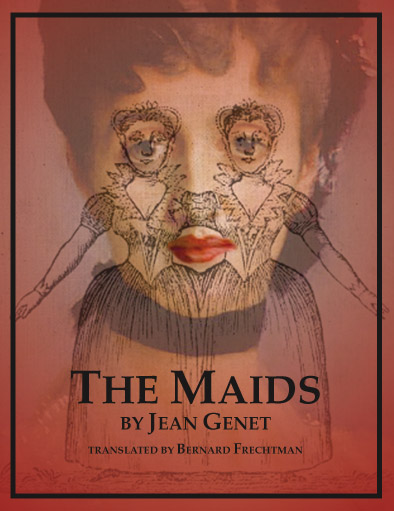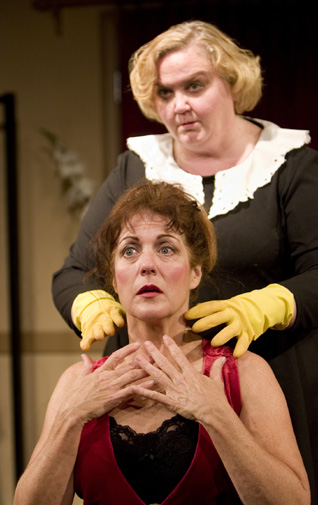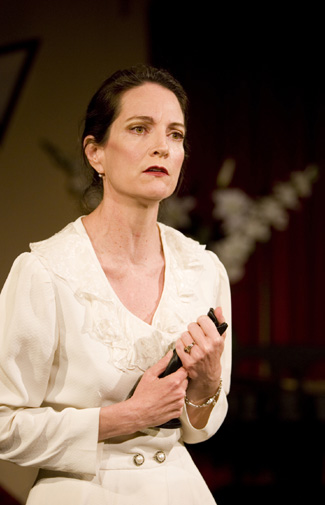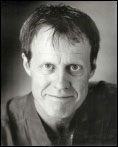




|
A man must dream a
long time in order to act with grandeur,
and dreaming is nursed in darkness.
|
| —Jean Genet |

Directed by Joseph McGrath
Musical direction by Harlan Hokin
Produced by special arrangement with Samuel French, Inc.
Featuring Susan Arnold, Cynthia Meier, and Arlene Naughton
Musical Prologue with Harlan Hokin, Joseph McGrath
and David Morden
January 11–28, 2007
Thursday–Saturday 7:30 pm, Sunday 2:00
PM
Musical Prologue begins 15 minutes
before curtain
Preview Night Thursday January 11 7:30 PM
Pay-What-You-Will Night Thursday January 18 7:30 PM
No performance Friday January 19
Performance Schedule
Cabaret Theatre, Temple of Music and Art, 330
S. Scott Ave., Tucson
See
map
The Maids is a deep and turbulent exploration
of two servant sisters who play games,
both make-believe and real,
in which they impersonate their mistress
and express their own love/hate relationship.
View the full
poster
View production photos

Claire and Solange
(Susan Arnold and Cynthia Meier)

Madame
(Arlene Naughton)
Photos by Tim Fuller
The Maids
4-page review by Iris J. Arnesen in the March, 2007 The
Opera Glass
Virtual Reality —Three excellent
plays all deal with perception in entertaining ways
Review by James Reel in the January 25 Tucson
Weekly
The Maids yet another Rogue
Theatre winner
Review by Kathy Allen in the January 19 Arizona
Daily Star
The Maids explores chance
to kill from every angle
Review by Chuck Graham in the January 18 Tucson
Citizen
An Interview with the Director
Preview by Sherilyn Forrester in the January 5 Arizona
Daily Star
Director’s Notes
“Ripped from the headlines” is a phrase that
Jean Genet would appreciate—with some irony and a great deal of
delight. The Maids was one of the first literary treatments of
an actual crime committed in 1933 in Le Mans, France. Two maids, the Papin
sisters, murdered and mutilated their mistress and her daughter. It was
a shock. They had been otherwise very quiet and reserved in their demeanor.
The crime caught the French imagination. What had gone on here? What dark
and awesome forces had quietly gathered in this unremarkable place? Genet’s
play looks at these questions without actually restaging the Papins’
crime. The mere facts of the real world are much too mundane, disappointing
and prosaic for Jean Genet.
At first blush, The Maids might seem to be a statement in sympathy
with the oppressed classes. Genet’s sympathies certainly lie with
those less favored by society, since he himself, imprisoned as a criminal,
and at times surviving as a male prostitute, might be the most outsider
figure of writers. But he reaches much deeper than mere class or economic
circumstances. In fact, at some point you realize that such circumstances
don’t seem to concern him at all.
There are two major ideas, I think, that Genet is pursuing in The
Maids. The first is directly tied to his life in crime and prison:
namely, the individual’s relationship to authority. In Genet’s
view, our relationship to society is defined by dominance and submission,
both of which offer joys and misery. This authority comes through official
channels (law and convention, i.e., government and class)—and unofficial
channels (struggles for dominance among peers).
A second, and deeper, more resonant theme is our search for satisfaction
as we face those forces that dominate us. This gives rise, in Genet’s
view, to rituals and ceremonies that depict imagined realities which offer
us some consolation.
Can I possibly touch on all the other themes and resonances of this play
in these notes? Impossible. Usually, the rehearsal process involves spending
a few days figuring out the actions—the “what” of a
play—, and the remaining weeks are spent making choices in the process
of rendering those actions—the “how” and the “why.”
With this project, however, the actions and events of the play have been
elusive at every step, because there is so much going on. I haven’t
even discussed sexuality and gender, role-playing, the criminal as saint,
the fact that in French the same word is used for “maid” and
“good”, etc.—and, of course, those things that you might
see or hear that haven’t even occurred to us.
So let us look under the rugs, behind the drapes, between Madame’s
sheets or in the sink for M. Genet’s many messages to us. We are
allowed. We are the maids.
—Joseph McGrath, Director
|
|
|
Cast |
| Claire |
|
Susan Arnold* |
| Solange |
|
Cynthia Meier |
| Madame |
|
Arlene Naughton |
*Member of
Actors’ Equity Association,
the Union of Professional Actors and Stage Managers in the United
States,
appearing under a Special Appearance Contract
|
| |
Production
Staff |
| Stage Manager |
|
James Naughton |
| Marketing
and Publicity |
|
Thomas Wentzel |
| Poster and Program |
|
Thomas Wentzel |
| |
Designers |
| Scenic Design |
|
Joseph McGrath |
| Costume Design |
|
Cynthia Meier |
| |
Our Thanks |
Jenny Carrillo |
|
David Hoffman |
James Reel |
|
Chuck Graham |
Jesse Greenberg |
|
Kathy Allen |
Patricia Dickson |
|
Carol Elliott |
Barbara Tanzillo |
|
Arizona Theatre Company |
William Killian |
|
Eileen Bagnall |
| All Our Advertisers |
Cast Biographies
|
|
|
 |
Susan Arnold
(Claire) works in theater and film as an actor,
director, writer and producer. She recently appeared as Gertrude
in Southwest Shakespeare’s production of Hamlet,
for which she received an Arizoni nomination for Best Actress. Her
roles in local productions include Circe in The Rogue Theatre’s
Endymion, Vita Sackville-West in White Garden,
Polina in The Seagull, April in Hotíl Baltimore,
and FS in Anger Box. Her regional credits include Maria
Callas in Master Class, Molly in Molly Sweeney,
Patsy in A Closer Walk with Patsy Kline, Maria in Twelfth
Night, Lady Macbeth in Macbeth, Kathy in The Kathy
and Mo Show and Halbrech in Scotland Road. Susan is
a member of Screen Actorís Guild and has several commercial and
independent film credits. She received her M.A. from the University
of Arizona and currently serves as Artistic Director for C.A.S.T.,
Clean and Sober Theatre in Tucson. |
| Cynthia
Meier (Solange) has performed in Endymion
and The Balcony (The Rogue Theatre), A Streetcar
Named Desire (Arizona Theatre Company), Blithe Spirit,
A Midsummer Night’s Dream (Michigan Repertory Theatre),
Romeo & Juliet, Chicago Milagro (Borderlands
Theatre), Top Girls (Damesrocket Theatre), A Namib
Spring (by Patrick Baliani, winner of the 1999 National Play
Award), A Nightingale, Smirnova’s Birthday,
The Midnight Caller, The Ballad of the Sad Cafe
(Tucson Art Theatre), and A Maid’s Tragedy (directed
by Domini Blythe of the Royal Shakespeare Company). Cynthia adapted
and directed James Joyce’s The Dead and directed
Wallace Shawn’s The Fever for The Rogue Theatre and
directed Chekhov’s The Seagull (featuring Ken Ruta)
for Tucson Art Theatre. Cynthia is a Division Dean at Pima Community
College and holds a Ph.D. in Performance Studies from the University
of Arizona. |

|
 |
Arlene
Naughton (Madame) most recently played the Horse
in The Balcony, Mary Jane in The Dead, and Venus
in Endymion, all for The Rogue Theatre. Her Arizona credits
include Nunsense (Flagstaff Festival of the Arts), Brighton
Beach Memoirs (Serendipity Playhouse), A Christmas Carol
(Gaslight Theatre); and Wigged Out! (Stray Theatre Company).
Arlene also toured with the Nebraska Theatre Caravan and performed
in Lady Audley’s Secret (Imperial Hotel) and I’ll
Be Back Before Midnight (Derby Dinner Playhouse). She is a
licensed marriage and family therapist and works at Cottonwood de
Tucson. |
|
|
|
Musical
Prologue to The Maids |
| The Piano Player |
|
Harlan Hokin |
| The Man in the Tuxedo |
|
J. Andrew McGrath* |
| The Man in the Silver Dress |
|
David Morden* |
*Member of
Actors’ Equity Association,
the Union of Professional Actors and Stage Managers in the United
States,
appearing under a Special Appearance Contract
|
Tango Choreography by John Dahlstrand
|
|
|
| Gymnopédies by Erik Satie |
|
Instrumental |
| L'Enfance de Ko-Quo by Erik Satie |
|
Instrumental |
| La Piège de Méduse by Erik Satie |
|
Instrumental |
| Carlotta's Galop by Nino Rota |
|
Instrumental |
| Night and Day by Cole Porter |
|
The Piano Player |
| Sylvie by Erik Satie |
|
The Man in the Tuxedo |
| As Long as I Love by Kurt Weill |
|
The Man in the Silver Dress |
| Elégie by Erik Satie [arr. Harlan Hokin] |
|
All Three |
| Tango dei Clowns by Nino Rota |
|
Instrumental with Dance |
| Je ne t'aime pas by Kurt Weill |
|
The Man in the Silver Dress |
|
|
|

|
Harlan Hokin (Musical
Director, The Piano Player) has performed extensively as a singer
in Europe and the United States, including a stint with the Oregon
Shakespeare Festival. He earned a doctorate in historical performance
practice from Stanford, and has taught at Stanford and UC Santa Cruz.
Harlan is an active workshop teacher and writer on topics of interest
to singers and early music performers. Recent theatrical involvement
has been with The Rogue Theatre as Musical Director for Endymion,
The Dead and The Balcony, and Arizona Onstage Productions
as Vocal Director for their production of Assassins. He is
currently serving as Artistic Director for the Arizona Early Music
Society and is the father of two nearly perfect teenagers. |
| Joseph
McGrath (Director, The Man in the Tuxedo) is a graduate
of the Juilliard School of Drama. He has toured with John Houseman’s
Acting Company, appearing in Pericles, Tartuffe,
Twelfth Night, and The Country Wife. At the Utah
Shakespearean Festival, Joe appeared in Hamlet, Henry
IV: Part I, and Much Ado About Nothing. In New York
City, he directed Rough Magic: A Shakespeare Quartet. In
Tucson, he is a frequent performer with Ballet Tucson appearing
as Quasimodo in The Hunchback of Notre Dame, a Stepsister
in Cinderella, Bottom in A Midsummer Night’s
Dream, VanHelsing in Dracula and, perennially, as
Drosselmeyer in The Nutcracker. He has also performed with
Arizona Theatre Company, Arizona Opera, Tucson Art Theatre, Arizona
OnStage, Green Thursday, Damesrocket Theatre, and Old Pueblo Playwrights
in such roles as Trigorin in The Seagull, Sam Byck in Assassins,
John in Oleanna, Weeping Willow Walter in Threepenny
Opera, and This Rock in Anger Box. Joe is the Artistic
Director for The Rogue Theatre, for which he directed The Balcony
and Endymion, performed The Fever, and performed
in The Dead and Endymion. Joe is also a scenic
designer and owns Sonora
Theatre Works with his wife Regina Gagliano, producing theatrical
scenery and draperies. |

|

|
David
Morden (The Man in the Silver Dress) appeared most
recently as Glaucus in The Rogue Theatre’s production of Endymion
and Constable Smith in the Arizona Opera’s production of The
Threepenny Opera as well as singing in the chorus of The
Flying Dutchman. As an actor, he has performed locally with
Arizona Onstage Productions (Assassins), Actors Theatre
(The Bible: The Complete Word of God (Abridged)) and Green
Thursday Theatre Project (Anger Box, Rain), of
which he is a co-founder. As a director, he has worked with Green
Thursday (Shakespeare’s R&J, White Garden),
Oasis Chamber Opera and Arts For All. A member of the Tucson Symphony
Chorus, he will delve once again into the world of opera this spring
in the chorus of Arizona Opera’s Susannah. |
Performance
Schedule for The Maids
Location: Cabaret Theatre, Temple of Music and Art, 330 S. Scott Ave. See
map
Musical Prologue begins 15 minutes before curtain
Thursday January 11, 2007, 7:30 pm (Preview)
Friday January 12, 2007, 7:30 pm
Saturday January 13, 2007, 7:30 pm
Sunday January 14, 2007, 2:00 pm matinee
Thursday January 18, 2007, 7:30 pm
Friday January 19, 2007 NO
PERFORMANCE SCHEDULED
Saturday January 20, 2007, 7:30 pm
Sunday January 21, 2007, 2:00 pm matinee
Thursday January 25, 2007, 7:30 pm
Friday January 26, 2007, 7:30 pm
Saturday January 27, 2007, 7:30 pm
Sunday January 28, 2007, 2:00 pm matinee
|
 T U C S O N A R I Z O N A
T U C S O N A R I Z O N A T U C S O N A R I Z O N A
T U C S O N A R I Z O N A